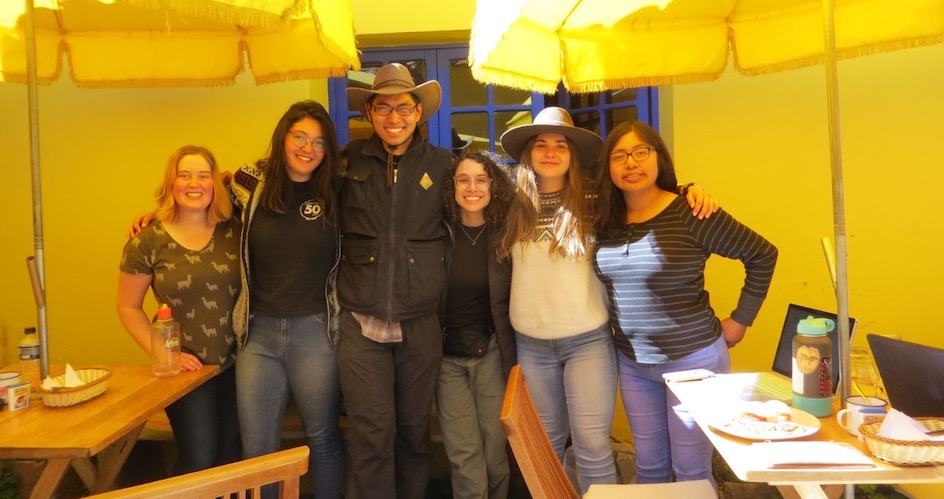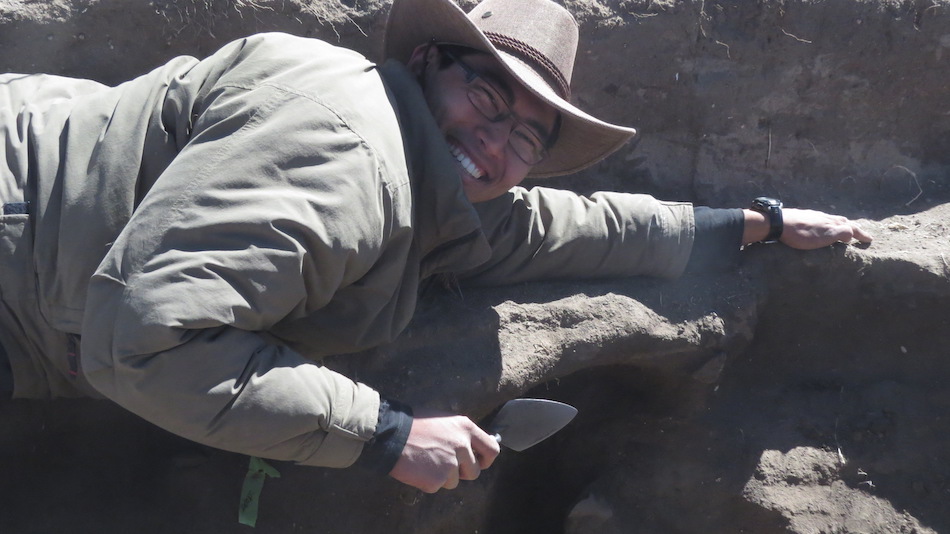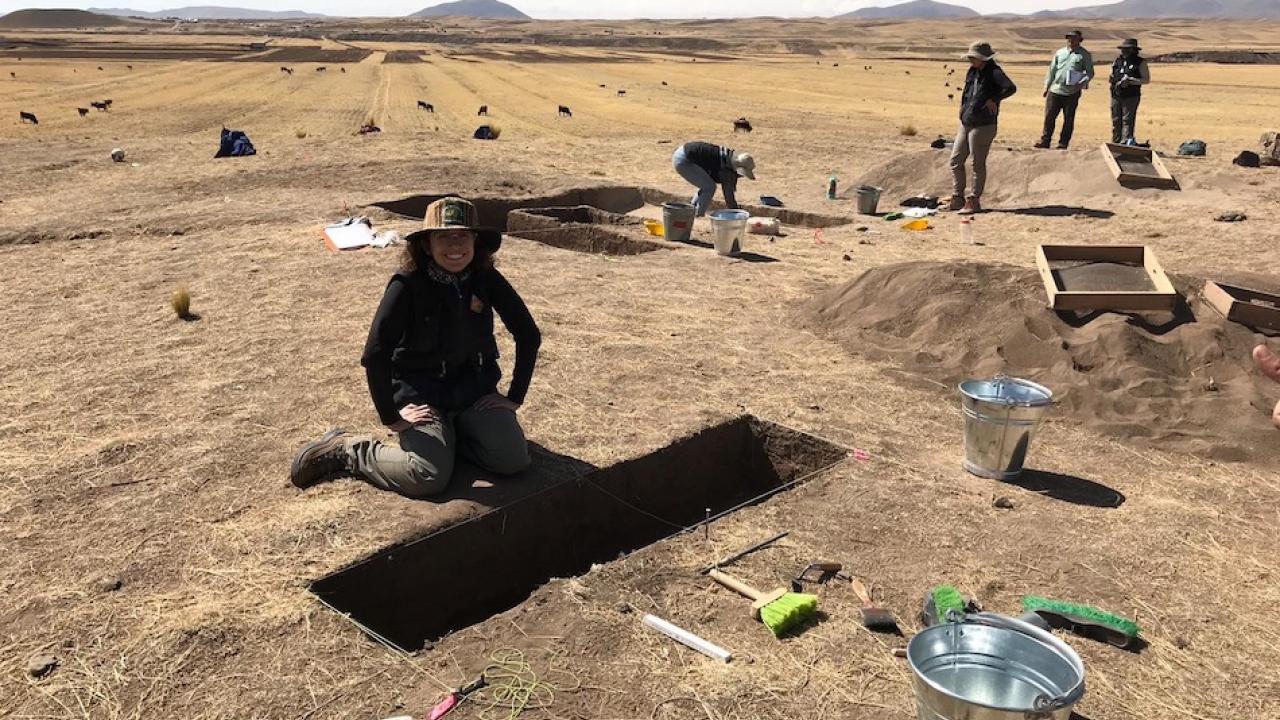When people think about anthropology graduates at work, one character from an ’80s movie often comes to mind.
“A lot of people equate anthropology with Indiana Jones,” said Kelli Sholer, undergraduate advisor for anthropology and sociology majors. “Just because you don’t want to be Indiana Jones doesn’t mean you don’t want to go into anthropology. That’s not what being an anthropologist is. That’s one area within the field.”
Anthropologists do more than dust off artifacts in a sandy desert. Indiana Jones practiced archaeology — one subfield among many. Evolutionary anthropologists study natural and social sciences to understand the evolution of both the human body and behavior. Sociocultural anthropologists focus on cultures and their many complexities.
Regardless of which track you choose, any degree in anthropology prepares students for a variety of careers. You could use your knowledge of ethnographic studies and understanding of human behavior to work in marketing, user-experience design or research, social work, or diversity and inclusion within human resources departments. If you’re more scientifically inclined, you could go on to study medicine, investigate crimes using forensics, or work as a biologist.
“No matter what field you go into, employers want employees who can problem-solve and see challenges from different angles,” Sholer said. “Whether that’s looking at a website or marketing materials, anthropology graduates could apply this to any field. They understand how someone’s background intersects with the experience they’re having. They have the anthropological view to problem-solve with critical analysis.”
Life in the anthropology major

The anthropology major offers students a balanced lifestyle. You’ll have classes that fuel your curiosity, as well as on-campus clubs and organizations that invigorate your passion for studying human behavior. Global experiences are not only welcome but encouraged, as study abroad challenges students to immerse themselves in new cultures. For sociocultural anthropology students, any study abroad program counts toward their major.
The major includes classes on the coevolution of crops and people, Neanderthals and human origins, cultures of consumerism, Star Trek as social theory, modern South Asian cinema, and sexualities. The broad range of subjects allows students to choose the aspects of human behavior and evolution that most interest them.
One very popular class covers global medicine, and it opens students’ eyes to new perspectives.
“They look at approaches to Western medicine and Eastern medicine and how different cultures view healing,” Sholer said. “Students’ eyes are open to these things they initially believed were very black or white.”
Rebecca Michelson, a UC Davis anthropology graduate, said a medical anthropology class was one of her favorites throughout undergrad.
“Looking at the medical field as defined by more than just science but also by cultural values opened my eyes to how healing can occur on multiple levels,” she said. “So something we could consider as mental health issues in the U.S. could be seen as a gift or talent in other cultures, and it opened up my eyes to the world.”
Choose your specialty
At UC Davis, the Department of Anthropology offers four different major specializations, in addition to an anthropology minor:
- B.A. in evolutionary anthropology for students who want a solid foundation in biological anthropology
- B.A. in sociocultural anthropology for those who want to immerse themselves in studying cultures and the varied ways in which people around the world organize their lives and interpret their circumstances
- B.A. in general emphasis anthropology for students who’d like an interdisciplinary approach that combines evolutionary and sociocultural anthropology
- B.S. in anthropology for students who want to graduate with a bachelor’s in science with an emphasis in evolutionary anthropology while taking coursework in other science and math classes. This track prepares students for careers in health, science and forensic investigation.
With an anthropological lens, the entire college experience can become part of your education. A student-led Anthropology Club welcomes students from any major. They meet weekly and host guest speakers to talk about career development, grad school and subjects tangential to anthropology such as climatology.
“Transfer students find their community in the department,” Sholer said. “The Anthro Club is a pretty active group having 20 students at their meetings on average.”
Students can intern in anthropology-related jobs on or near campus. For those with an archaeological bent, an internship at the Center for Experimental Archaeology gives hands-on experience. For those interested in museum curation, the Department of Anthropology Museum offers internships where students do educational outreach to schools to expose younger students to anthropology.
Research opportunities on campus help equip students for academic careers. All of the faculty do their own fieldwork, and undergraduate students help them with tasks like transcribing interviews and preparing samples brought back from archaeological sites. Biological and evolutionary anthropology students can take part in physical labs throughout campus to do original research.
Off campus, the Archaeology Field School takes students to archaeological sites in California and Peru so that they can put their learnings into fieldwork. In a four-unit class, students conduct surveys and excavate relics. They get their hands dirty doing work that’s relevant for careers in archaeological research and cultural resource management.
Overall, the major gives students a strong foundation to enter academic and nonacademic careers. They leave with skills in writing, critical analysis, research and cross-cultural understanding.
Life after the anthropology major

Anthropology resources
Want to test the waters and see if anthropology is the right major for you? Faculty of the Anthropology Department shared a list of books, films and other resources for you to try the subject on for size. Here's a sampling:
- Blog post, “Anthropology in Star Trek: TNG”
- Book, A Possible Anthropology: Methods for Uneasy Times by Anand Pandian
- Book, Galapagos by Kurt Vonnegut
- Podcast, Women in Archaeology
- Video, 100 Humans: Life's Questions Answered (Netflix)
- Video, The Human Spark (PBS)
Anthropology graduates from UC Davis have entered a variety of industries. They’ve worked at Amazon, the National Park Service, Georgia Department of Transportation, Santa Cruz County Coroner’s Office, Palo Alto Medical Foundation, Natural History Museum of Los Angeles, the Ministry of Foreign Affairs — the list goes on.
For Michelson, the anthropology major led to jobs in research, academia and the private sector. After graduation, she became a research assistant for a reproductive health think tank at the University of California, San Francisco.
“I used my qualitative research skills for interviewing, data collection, analysis and synthesis, for projects on reducing abortion stigma,” she said.
After that, she went on to work as a design researcher at the Engagement Lab at Emerson College, then at a biotechnology company.
“I was surprised to learn over the years that there are professional ethnographers that work in corporations and the public sector, and that qualitative research is valuable for technology and design development,” Michelson said. “As a user researcher, you’re a steward of people’s stories as well as their needs and preferences and desires. These can be translated to how a technology or design is implemented, so it’s an extremely valuable skill set and approach.”
Most recently, Michelson has decided to reconnect with the passion that drew her to anthropology in the first place. At the start of college, she wanted to become a midwife after watching her cousin give birth at home. She realized that birth isn’t just a medical issue, but a cultural phenomenon. That interest in supporting family well-being inspired her to return to research. Now, she’s a graduate student in anthropology at the University of Washington, where she’s studying how families are using technology to balance work and school during quarantine.
“It’s pretty rewarding to elevate the stories of parents’ daily wins and struggles in service of designing better technology,” Michelson said. “It’s exactly why I came to grad school, to support families and maternal health with innovation. Families tend to be a marginalized group, compared to technological developments that focus on individual consumers.”
With their critical analysis skills, anthropology majors can do just about anything.
“Stay open-minded, curious and flexible in where your interests lead you,” Sholer said. “The unexpected opportunities out there may be things you hadn’t planned for originally. Don’t cave to the pressure of feeling like you need an exact plan. There’s a lot of opportunity to make pivots throughout your life with the transferable skills anthropology gives you. Stay open-minded about your interests and where that’s going to take you.”
Rebecca Huval is digital managing editor of the Majors Blog.
